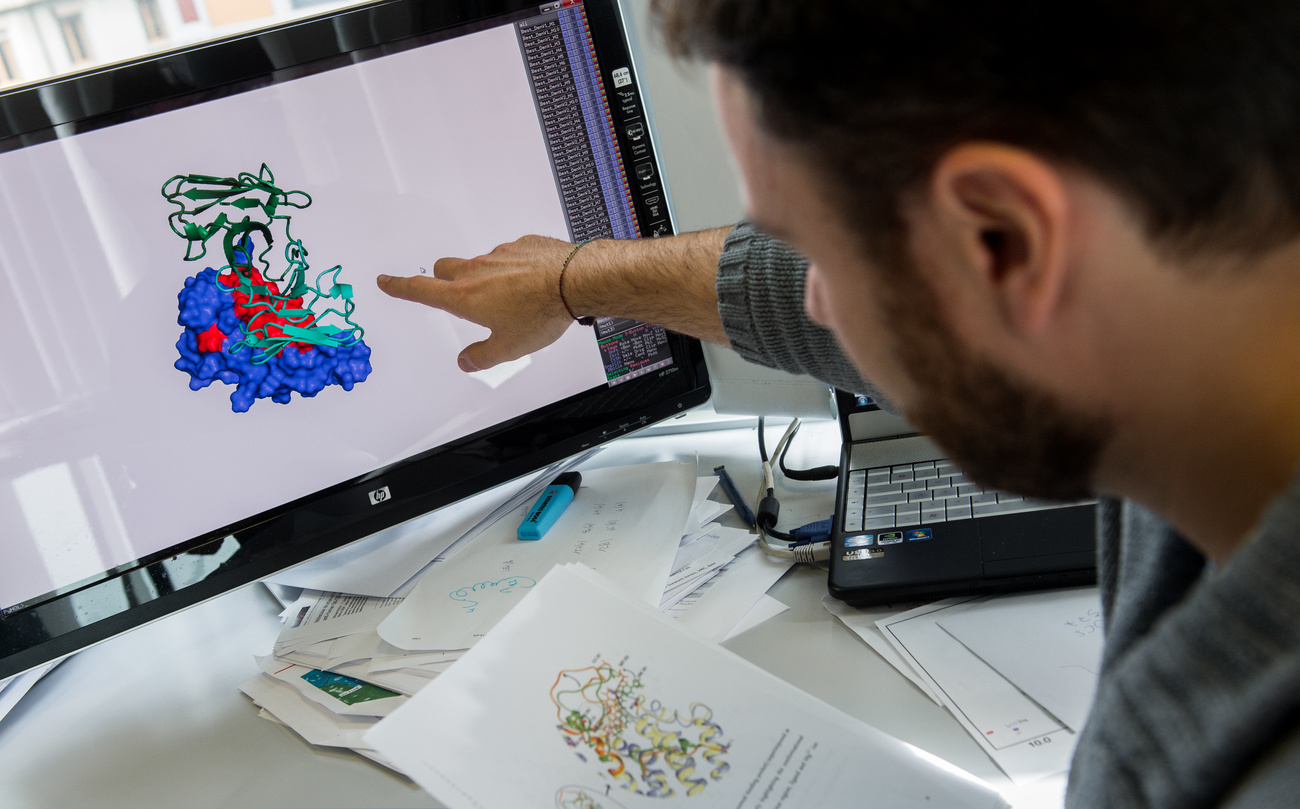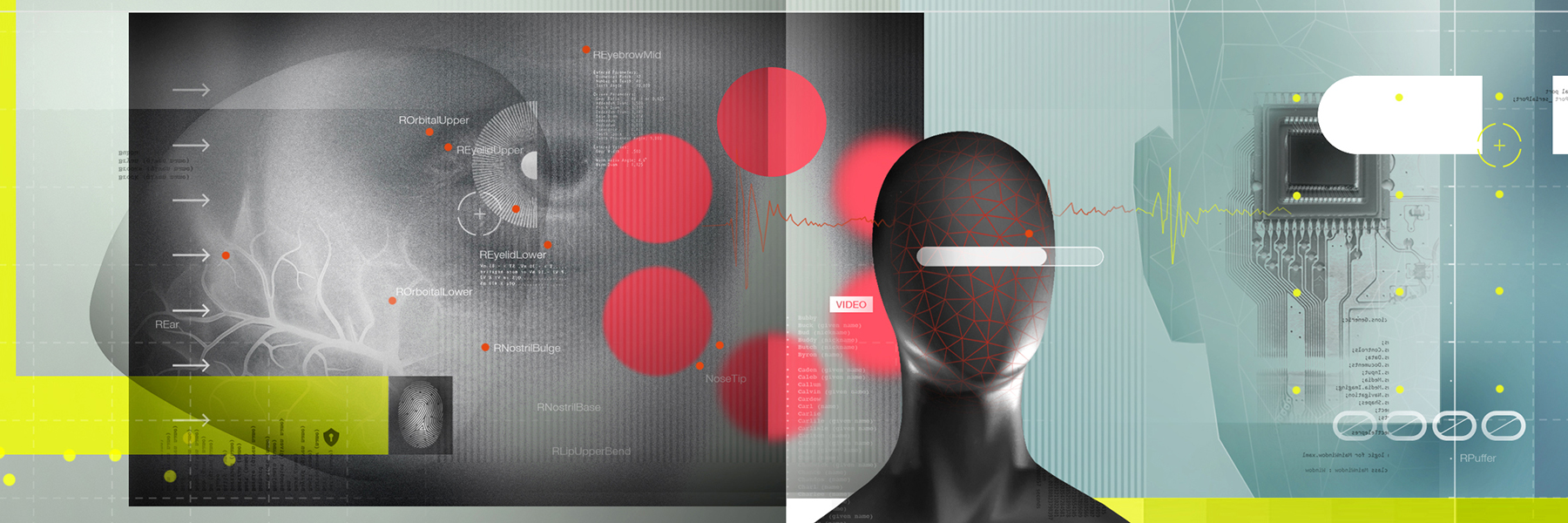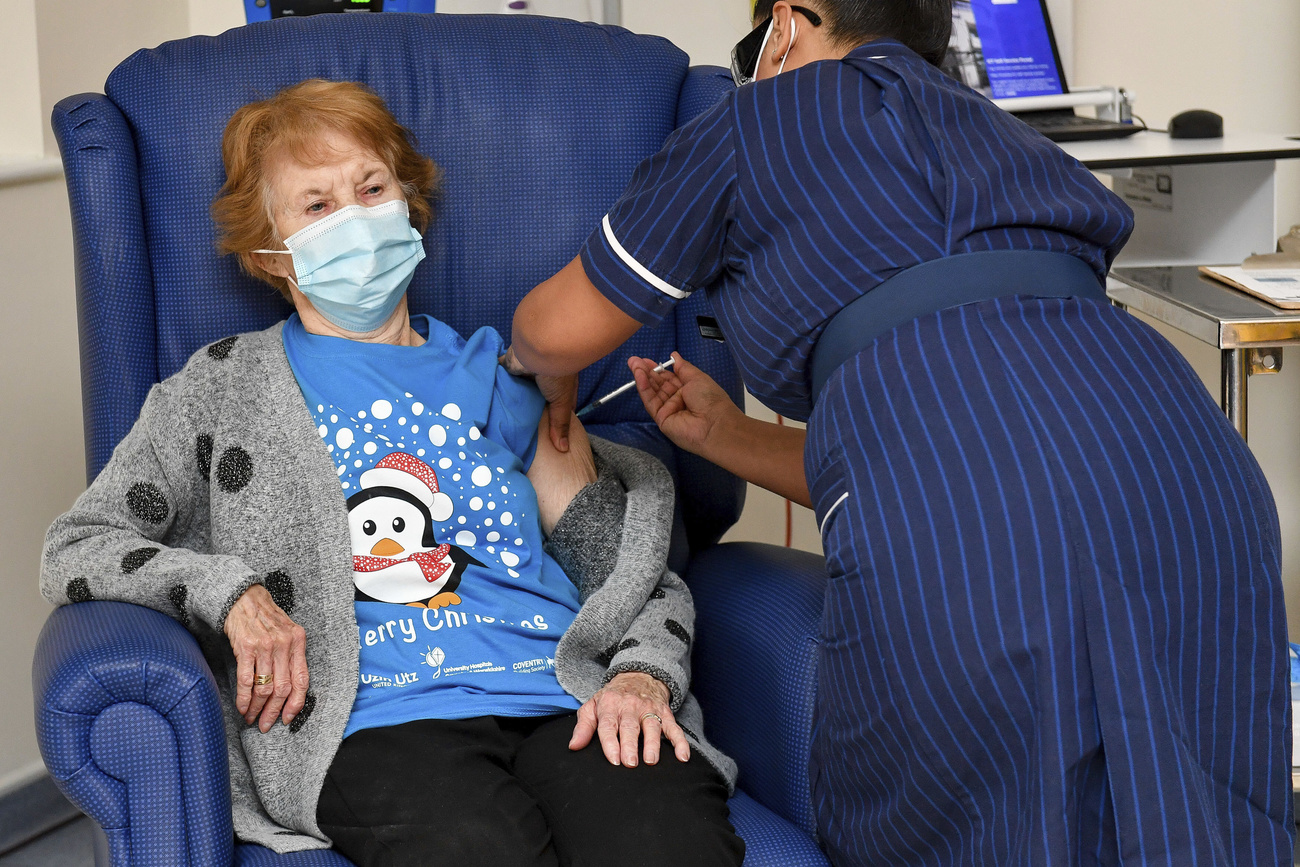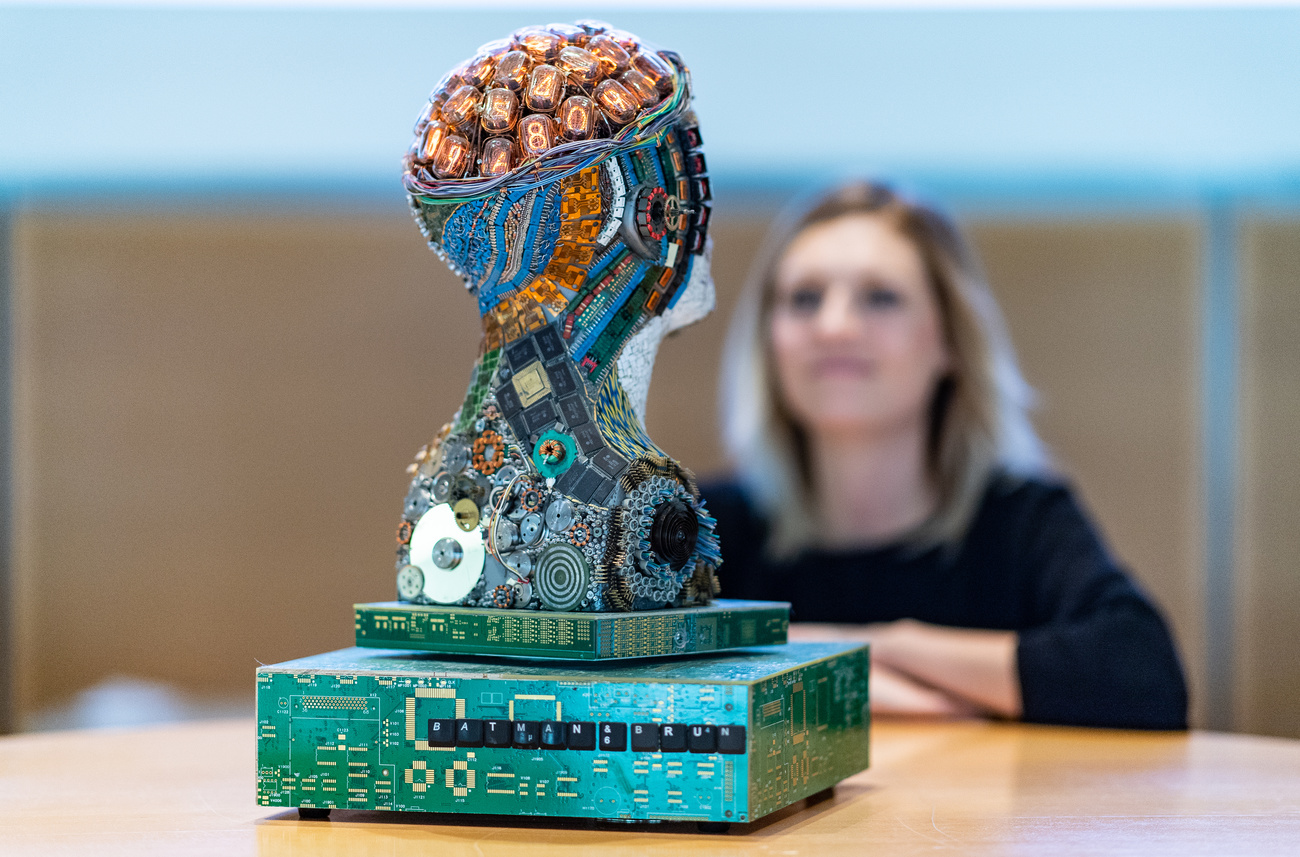
Vaccines and beyond: How AI is shaping our pandemic response
With the new year, vaccination campaigns are gaining momentum in Switzerland and around the world. Fears and scepticism exist, but the good news is that science is running at full speed, unravelling age-old mysteries with the help of artificial intelligence (AI).
Having recently joined the team of SWI swissinfo.ch science reporters, I’m happy to be here with you to unpack key research in the area of AI and robotics in this and future editions of this newsletter. Every three weeks, my colleagues and I will be taking turns updating you on what’s new and what we’re watching when it comes to scientific discoveries and questions out of Switzerland that impact our lives, make us wonder or just say “that’s cool”!
Is there something you’re wondering about, or want to share on the scientific front? Reach out at sara.ibrahim@swissinfo.ch. Sign up below to get this briefing in your inbox:
This week: vaccines, and the technology that brought them to us.
“Each one of us should choose to trust scientific data and healthcare experts over unfounded conspiracy theories and self-serving politicians,” wroteExternal link the Israeli historian Yuval Noah Harari back in March 2020.External link His words turned out to be prophetic.
Some of my acquaintances say they won’t get vaccinated “because you don’t really know what’s in them” or because “I don’t trust these new technologies, better the traditional vaccines that come from China and Russia”.
A few weeks ago, SWI swissinfo.ch launched an online debate asking its readers if they would get vaccinated and why. The discussion that ensued is interesting and heated and is still ongoing. But where does the truth lie? Our fears and doubts are legitimate, but the loss of faith in science is frightening in the face of an uncertain future and the next possible pandemic always on the horizon. What do you think? Join here:
More
AI vs pandemic
In recent months, science has shown unprecedented speed and collaboration. The first vaccines against the coronavirus were being tested less than three months after the outbreak of the pandemic in China. Today, some 60 potential vaccines are in clinical development. Many people wonder how it was possible to make highly effective vaccines in so little time. Some think it is not possible and are therefore wary. But this paradigm shift in vaccine development was possible thanks ground-breaking technologies like artificial intelligence (AI). Here’s how it changed the game:
AI and new vaccines: Many of the new Covid-19 vaccines owe their rapid development to artificial intelligence (AI). AI and international scientific collaboration – including from Switzerland – have been instrumental in rapidly advancing research on the coronavirus, especially in the field of predicting the protein structures of SARS-CoV-2. Proteins give us a lot of information about the cells of living beings and play a central role in the development of effective vaccines. For example, they are at the heart of the mechanisms that make the RNA-based vaccines work from Pfizer and Moderna work.
Thanks to the use of advanced algorithms and machine learning techniques, it’s now possible to predict the shape of proteins very accurately and without waiting for months of research.
“It’s a real breakthrough, because now AI can achieve something that no human with in-depth knowledge of protein modelling had been able to do before,” Torsten Schwede told me for this story. In his role as head of the research group at the Swiss Bioinformatics Institute SIB, he worked on SWISS-MODEL, an automated server that pioneered the computer modelling of protein structures worldwide.

More
Artificial intelligence helps bring about record-fast vaccines
AI and vaccine distribution: For some time now, mathematicians have been studying the best distribution strategy for anti-Covid vaccinesExternal link, modelling different scenarios to understand whether it is better to focus on slowing down infections or reducing mortality. In the field of vaccine strategy, artificial intelligence and blockchain technology are seen as important tools to predict demand for vaccinesExternal link, manage the supply chain and ensure they are distributed fairly. AI could also prove to be a valuable aid in identifying patients at risk of experiencing side effects more quickly after getting vaccinated. This is why the UK is using machine learning software that can read medical records and identify patients at risk.
AI and virus mutations: As concern grows among governments and citizens about virus mutations, a new study has shown that the anti-Covid vaccine also works against the two mutationsExternal link identified in the UK and South Africa. Pfizer confirmed this, but experts urged caution, warning that the new variants also carry other potentially dangerous and as yet unknown mutations, the New York Times reported.
Meanwhile, research in the US has uncovered potentially more contagious mutations of the coronavirusExternal link thanks to new spatio-temporal and explainable AI models. These findings provide valuable insights into drug development and more effective pandemic response strategies.
So now that vaccines are here, how – and how fast – are they getting into people’s arms?
My colleague Simon Bradley looks at the situation in Switzerland and beyond:
The vaccination campaign in Switzerland started at the end of December after the Pfizer/BioNTech mRNA vaccineExternal link – the Covid-19 vaccine trailblazer – was approved by the Swiss health regulator. Swissmedic this week gave the green light to a second mRNA vaccine – the Moderna mRNA vaccine – which has also been approved by the US, Canada and the European Medicines Agency. Others are expected in the coming weeks, most probably starting with the Oxford/AstraZeneca “viral vector vaccine”.External link
The countries with the highest vaccination rates (doses per 100 people) are Israel (almost one quarter of its population), the United Arab Emirates and Bahrain, according to OurWorldInDataExternal link. They are followed by the UK and the US (which topped 10 million vaccinations this week). The Swiss vaccination campaign is slowly ramping up amid criticism of the authorities dragging their feet. Health officials say all at-risk groups should be vaccinated by the end of March. Swiss authorities still haven’t provided any consolidated national Covid-19 vaccination figures. But a rough initial estimate from the Federal Office of Public Health on January 14 (66,000 people) would put it among the top 20 countries worldwide in terms of how many have gotten the jab.
Swiss-made vaccine: Last spring three Swiss research projects were being cited among the top 15 frontrunners in the race to find a Covid-19 vaccine. Today they have gone quiet, as Swiss public television reportsExternal link. But a great deal of Covid-related research continues in Switzerland. The Moderna vaccine even comes with a “Made in Switzerland” label. That’s because the drug manufacturer Lonza is making Moderna’s active vaccine ingredients at its factories in Visp, near the Matterhorn mountain. Production has started at the first of three new manufacturing lines which will aim to supply 300 million doses annually for non-US markets.
But the production of the Moderna vaccine is truly global. Once Lonza-made ingredients are completed at Visp, they are deep-frozen and sent by truck to a lab near Madrid, Spain, for “fill and finish”, to be put in vials and loaded on pallets. Swiss logistics firm Kuehne + Nagel is ensuring the worldwide distribution of the Moderna vaccine doses from production sites based in Europe. For Switzerland and the rest of Europe, it transports Moderna’s vaccine from sites in Spain and France to its Belgium hub, then coordinates distribution throughout Europe.
Do you have questions about the vaccine technology, rollout or logistics? Reach out to Simon at simon.bradley@swissinfo.ch, and watch out for his upcoming story on the topic on swissinfo.ch next week.
Finally, back in the world of AI, some controversial developments: Remember the debate on the validity of contact-tracking apps? Well, MIT Technology Review reports that in Singapore, the police now have access to data collected by the local contact-tracing systemExternal link for use in the course of criminal investigations. This contrasts with the privacy policy initially outlined by the government and raises serious questions about the ethical validity and reliability of digital contact-tracing systems.
“Technological uptake is an open-ended process reliant upon social learning and the piecemeal creation of public trust,” write ETH Zurich bioethicists Alessandro Blasimme and Effy Vayena in an essayExternal link published in the journal Science and picked up by MIT Technology Review.
(Our special page on the ethics of Artificial Intelligence looks at these tricky questions much more in-depth).
Everything in life is a matter of trust. Science and technology are no different.

More
The ethics of artificial intelligence

In compliance with the JTI standards
More: SWI swissinfo.ch certified by the Journalism Trust Initiative






































Join the conversation!